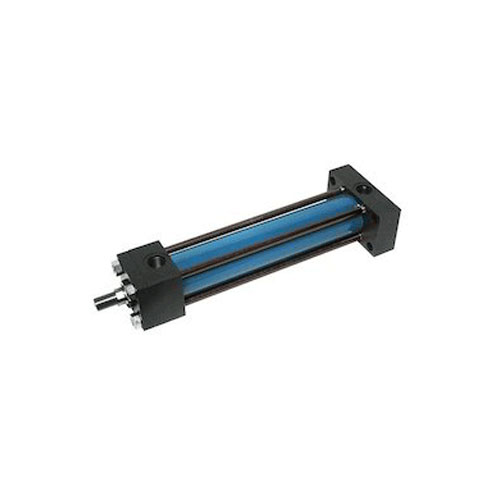Industrial Hydraulic Cylinders
What are Industrial Hydraulic Cylinders?
Industrial Hydraulic Cylinders are essential components for power transmission in heavy machinery and are particularly suitable for use in harsh operating conditions. They are commonly used in a wide range of industrial applications, including general mechanical engineering, moving factories and purification plants, presses, cranes, steel construction for hydraulic engineering or shipbuilding.
There are two types of Industrial Hydraulic Cylinders available, screwed and welded chambers. Welded chambers stand out for their short and compact design. They have been extensively tested and inspected for up to 2 million load cycles, ensuring reliable performance under extreme conditions. These cylinders are equipped with advanced features and a high level of functionality, making them highly appreciated in various industries.
Some of the notable features of Industrial Hydraulic Cylinders include piston rods with high tensile strength, position sensing and proximity switches that can be supplied as per the requirement, and durable and robust welded construction.
GM Industries is a leading hydraulic cylinder manufacturers in India, offering a comprehensive range of products that are known for their quality, reliability, and performance. The company has a team of experienced professionals who are dedicated to providing exceptional customer service and delivering customized solutions to meet the unique requirements of their clients. With a focus on innovation and continuous improvement, GM Industries is committed to staying at the forefront of the industry and providing the best products and services to its customers.
Industrial Hydraulic Cylinders Price
The Hydraulic Cylinder Price offered by Industrial Hydraulic Cylinders manufacturers is listed below: –
| Product Range | Price |
| Industrial Hydraulic Cylinder | ₹ 1.20 Lakh / Unit |
(Prices shown above are provisional prices and may change due to different market conditions and requirements.)
For more information on any of our high quality products or getting accurate prices contact GM Industries at
Call Us
+(91)-9820533489 / 7738562224
Enquiry Form
Submit
How Does an Industrial Hydraulic Cylinder Work?
The function of a hydraulic cylinder is based on the principle of Pascal’s law, which states that pressure applied to a confined fluid is transmitted equally in all directions. In a hydraulic cylinder, a hydraulic fluid, such as oil, is contained in a chamber, which is connected to a piston that moves back and forth inside a cylinder. When pressure is applied to the fluid, it exerts a force on the piston, causing it to move in one direction or the other.
The movement of the piston is controlled by a valve system that regulates the flow of hydraulic fluid into and out of the cylinder. When the valve is opened, the hydraulic fluid flows into the chamber, pushing the piston in one direction. When the valve is closed, the fluid is trapped in the chamber, and the piston remains in its current position. By adjusting the valve, the operator can control the speed and direction of the piston’s movement.
The piston rod, which is attached to the piston, extends out of one end of the cylinder, and this is the part of the cylinder that is connected to the load being moved. As the piston moves back and forth, it exerts a force on the load, causing it to move in the desired direction.
Overall, the working principle of an Industrial Hydraulic Cylinder is simple yet effective, relying on the power of hydraulic fluid to move heavy loads with ease and precision.
Advantages of Industrial Hydraulic Cylinders
There are several advantages of Industrial Hydraulic Cylinders that make them a popular choice for various industrial applications. Here are some of the key advantages:
High force and torque
Hydraulic cylinders can generate a high amount of force and torque, making them capable of lifting and moving heavy loads with ease.
Smooth operation
Hydraulic cylinders provide smooth and precise movement, ensuring that loads are moved with accuracy and without any jerks or jolts.
Variable speed control
Hydraulic cylinders can be controlled to operate at variable speeds, allowing operators to adjust the speed of movement according to the requirements of the application.
High reliability
Hydraulic cylinders are known for their high reliability and durability, with a long service life and minimal maintenance requirements.
High flexibility
Hydraulic cylinders can be used in a wide range of applications, with the ability to adapt to different load capacities, stroke lengths, and operating conditions.
Easy installation
Hydraulic cylinders are relatively easy to install and can be configured to fit into existing machinery or equipment.
Energy efficiency
Hydraulic cylinders are highly energy-efficient, as they use hydraulic fluid to transmit power, which can be easily controlled and adjusted to minimize energy consumption.
Overall, the advantages of Industrial Hydraulic Cylinders make them a preferred choice for various industries that require high-performance power transmission components that can withstand harsh operating conditions while providing precise and reliable movement.
Applications of Industrial Hydraulic Cylinders
Industrial Hydraulic Cylinders have a wide range of applications across various industries. Here are some of the common applications of Industrial Hydraulic Cylinders:
- Material handling: Hydraulic cylinders are commonly used in material handling equipment such as cranes, forklifts, and loaders to lift and move heavy loads.
- Construction: Hydraulic cylinders are widely used in the construction industry for various applications such as excavators, backhoes, and bulldozers to move heavy loads, dig trenches, and demolish structures.
- Manufacturing: Hydraulic cylinders are used in manufacturing processes such as metal stamping, plastic injection molding, and forging to apply force to the material being processed.
- Mining: Hydraulic cylinders are used in mining equipment such as drilling machines, excavators, and loaders to move and transport heavy loads in harsh mining environments.
- Agriculture: Hydraulic cylinders are used in agricultural machinery such as tractors, plows, and harvesters to lift and move heavy loads.
- Marine and offshore: Hydraulic cylinders are used in marine and offshore equipment such as oil rigs, ship cranes, and winches to lift and move heavy loads in harsh marine environments.
- Aerospace: Hydraulic cylinders are used in aircraft landing gear and hydraulic systems to control the movement of flaps, rudders, and other control surfaces.
Overall, Industrial Hydraulic Cylinders have a diverse range of applications across various industries, highlighting their versatility and importance in modern industrial processes.

How do I choose Industrial Hydraulic Cylinders?
GM Industries is a well-known industrial hydraulic cylinder manufacturers that is designed to meet the diverse needs of various industries. With years of experience in the field, GM Industries has the expertise and knowledge to provide customized solutions that meet the specific requirements of each customer. Our wide range of products, including both screwed and welded cylinders, ensures that customers can find the right fit for their application. Additionally, GM Industries provides advanced features such as position sensing and proximity switches, further enhancing the functionality of their hydraulic cylinders. Overall, GM Industries’ commitment to quality, reliability, and customer satisfaction makes them an ideal partner for finding the right Industrial Hydraulic Cylinders for your application needs.
Frequently Asked Questions
An Industrial Hydraulic Cylinder is a mechanical actuator that is used to convert hydraulic energy into mechanical force and motion.
The advantages of using Industrial Hydraulic Cylinders include high force and torque, smooth operation, variable speed control, high reliability, high flexibility, easy installation, and energy efficiency.
Industrial Hydraulic Cylinders work by using hydraulic fluid to transmit force to the piston, which moves in the cylinder to produce mechanical force and motion.
The maximum load capacity of Industrial Hydraulic Cylinders depends on various factors such as the bore size, stroke length, and operating pressure.
The maximum operating pressure of Industrial Hydraulic Cylinders depends on the design and materials used in their construction.
The common materials used to construct Industrial Hydraulic Cylinders include steel, aluminum, and various alloys.
Industrial Hydraulic Cylinders should be inspected regularly for signs of wear and tear, leaks, and contamination. The hydraulic fluid should also be checked and replaced regularly.
Industrial Hydraulic Cylinders can be repaired by replacing damaged parts such as seals, pistons, and rods.
The right Industrial Hydraulic Cylinder for your application depends on various factors such as load capacity, stroke length, operating pressure, and environmental conditions.
Single-acting cylinders use hydraulic pressure to move the piston in one direction only, while double-acting cylinders use hydraulic pressure to move the piston in both directions.
A welded cylinder is a type of hydraulic cylinder that is constructed by welding the end caps to the barrel, resulting in a shorter and more compact design.
A screwed cylinder is a type of hydraulic cylinder that is constructed by screwing the end caps onto the barrel, resulting in a longer and more flexible design.
Position sensing and proximity switches are advanced features that can be added to Industrial Hydraulic Cylinders to provide feedback on the position and movement of the cylinder.
The benefits of position sensing and proximity switches include improved control and accuracy, increased safety, and reduced maintenance.
